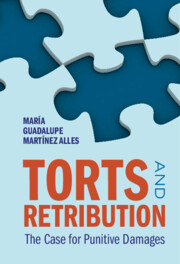Book contents
- Torts and Retribution
- Torts and Retribution
- Copyright page
- Dedication
- Epigraph
- Contents
- Preface
- Acknowledgments
- Introduction
- Part I The Place of Punishment in Torts
- Part II The Retributive Rationale
- Part III Retribution in the Mass-Market Setting
- Part IV Why Tort Law
- 9 The Significance of the Tort Victim
- 10 The Significance of the Tort Process
- Conclusion
- Bibliography
- Index
9 - The Significance of the Tort Victim
from Part IV - Why Tort Law
Published online by Cambridge University Press: 09 August 2025
- Torts and Retribution
- Torts and Retribution
- Copyright page
- Dedication
- Epigraph
- Contents
- Preface
- Acknowledgments
- Introduction
- Part I The Place of Punishment in Torts
- Part II The Retributive Rationale
- Part III Retribution in the Mass-Market Setting
- Part IV Why Tort Law
- 9 The Significance of the Tort Victim
- 10 The Significance of the Tort Process
- Conclusion
- Bibliography
- Index
Summary
This chapter offers a fresh reconstruction of the (legal) power to act punitively in torts that is respectful of the wrongdoer–victim perspective and, more particularly, to the substantive content of the victim’s punitive responses to categories of reprehensible wrongdoing. It challenges the assumption that criminal law and the criminal procedure are the exclusively valid institutional venues for the imposition of punishment by suggesting that Relational Retribution be a viable and valuable mode of institutional moral communication between the private parties that is proper of the role of the victim in tort law and its bilateral structure. It recognizes the special position of the victim herself to personally provide sufficient reasons for the court to exercise its power and impose a punitive sanction on the reprehensible wrongdoer. Ultimately, the idea underlying this chapter is that, if we care about individuals’ ability to engage meaningfully with their peers, we should ensure the availability of legitimate, official channels for institutional expression, one that tort lawsuits provide.
Keywords
Information
- Type
- Chapter
- Information
- Torts and RetributionThe Case for Punitive Damages, pp. 231 - 249Publisher: Cambridge University PressPrint publication year: 2025
Accessibility standard: WCAG 2.0 AA
Why this information is here
This section outlines the accessibility features of this content - including support for screen readers, full keyboard navigation and high-contrast display options. This may not be relevant for you.Accessibility Information
Content Navigation
Allows you to navigate directly to chapters, sections, or non‐text items through a linked table of contents, reducing the need for extensive scrolling.
Provides an interactive index, letting you go straight to where a term or subject appears in the text without manual searching.
Reading Order & Textual Equivalents
You will encounter all content (including footnotes, captions, etc.) in a clear, sequential flow, making it easier to follow with assistive tools like screen readers.
Structural and Technical Features
You gain clarity from ARIA (Accessible Rich Internet Applications) roles and attributes, as they help assistive technologies interpret how each part of the content functions.
